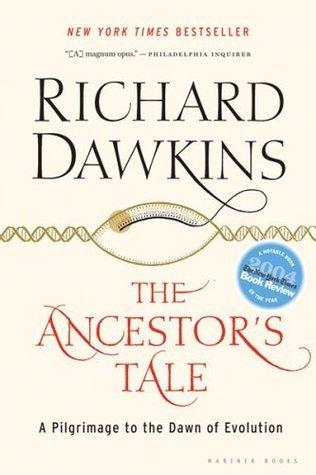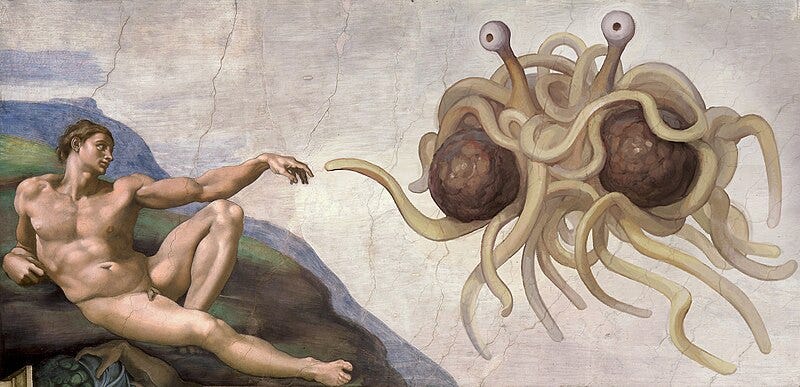I’ve never quite understood what it is about The God Delusion that makes people so angry. I finally understand. People think that Dawkins was doing philosophy. Badly.
The subject came up on Twitter this week when
did a little survey asking which is the “Best Richard Dawkins book?”.The correct answer is, obviously, The Ancestor’s Tale but the survey caused an avalanche of Tweets asking “What about The God Delusion? Ha! Ha! Ha!”
I follow a bunch of philosophers on Twitter and they are all adamant that The God Delusion is a terrible book of philosophy but I think they are mistaken. It isn’t a book of philosophy at all. I mean, sure, maybe there was some bad philosophy in there and maybe he didn’t address every nuance of the cosmological argument. But if you thought Dawkins did bad philosophy, then maybe the book just wasn’t for you.
But let’s go back a bit.
Back when Dawkins wrote TGD there was a four-alarm cultural fire going on in America about atheism and religion that makes the current battle over trans identity seem like a tiny spark. This was a shock to me as a recent immigrant to the USA.
Back home in England, most people I knew were either atheists or don’t-care-ists. I had plenty of religious friends but we never talked about religion. Politicians never talked about religion (“We don't do God” — Alastair Cambell). There was no culture war over religion and we went to church together because we were all cultural Christians whether we believed or not.
America was different. In America, politicians talked about God all the time.
There was exactly one congressman — Pete Stark — who was openly atheist and when Congress passed a law affirming that “this is one nation under God”, the entire Senate rushed out to the steps of Congress to recite the Pledge of Allegiance. Even the ticket collector at the San Jose Earthquakes asked me if Jesus was my Lord and Saviour.
“If you’re not electing Christians, then in essence you are going to legislate sin.”
— Representative Katherine Harris.
This was very different to how it was in England. English people don’t quite grok this if they weren’t in America at the time.
The number of atheists and ‘nones’ in America started to creep up in the 90s (Pew) and the religious culture battles in America caught fire around the turn of the century.
Until the New Atheists burst onto the scene, most non-believers kept their atheism to themselves even if — secretly —they did not believe in God because it was socially expensive to step out of the closet. I am not suggesting that atheists were martyrs or that they were imprisoned and tortured. It wasn’t dangerous to be openly atheist like it was for gays in the decades before then but it could make the difference between getting hired and not getting hired. It was close to impossible for an atheist politician to be elected. Most of my friends kept their atheism secret.
“I don’t know that atheists should be considered as citizens, nor should they be considered patriots. This is one nation under God.” — President Bush.
People with philosophical tendencies often criticise The God Delusion as poor philosophy. They say Dawkins does not understand religion enough to criticise it but I think they are missing the point.
You probably shouldn’t quote Dawkins in your philosophy of religion final exam — but you probably shouldn’t quote a popular science book saying that electrons are shiny silver balls in your physics final exam either.
Dawkins’ book wasn’t about philosophy. It was about whether it was acceptable to not believe in God.
There were several prominent legal cases around this time including the Dover Panda Trial. The Dover school district in Pennsylvania had changed its biology curriculum to require that intelligent design be taught in school using the textbook, Of Pandas and People.
Of Pandas and People was not explicitly religious but it contained several arguments against evolution and the introduction was written by a young earth creationist. Parents in the Dover school district sued, arguing that intelligent design was essentially creationism and that the Establishment Clause of the First Amendment did not allow religion to be taught in school. The Federal Court agreed and the teaching of intelligent design was banned.
The Dover Panda Trial was one of several cases that pitted creationism against evolution and a culture war ensued with warriors on both sides joining the battle. The most prominent of the warriors on the side of evolution was Bobby Henderson who founded the Church of the Flying Spaghetti Monster to protest another trial around the same time in Kansas. Henderson, wrote a satirical letter to the court demanding that "Flying Spaghetti Monsterism" be taught in schools alongside evolution and intelligent design.
For a while, it felt like a tidal wave of assault against evolution, rationalism and atheism. In hindsight, that was probably hyperbole but that’s how it felt at the time and The Four Horsemen turned the tide.
The Four Horsemen of New Atheism — Richard Dawkins, Daniel Dennett, Christopher Hitchens and Sam Harris — didn’t introduce any new arguments, but their prominence made atheists aware that there were other atheists out there. The Horsemen encouraged atheists to come out of hiding and speak up about their beliefs.
The God Delusion was fun compared to books by the other Horsemen. Dennett’s book was better philosophy but was snide and peevish. Harris’ and Hitchens’ book were mean and were guilty of the things that Dawkins was often accused of. The God Delusion was light-hearted and often funny. It wasn’t meant to be taken seriously as philosophy.
Dawkins was Public Enemy Number One for a while with weekly reports of some terrible thing he had supposedly said. The papers would quote some outrage but usually, when you dug into the story, it was a lie.
For example, the Daily Mail claimed that Dawkins said teaching religion to kids was worse than child abuse. Terrible, right?
Dawkins was actually relating a story told to him by a woman who said she had been abused as a child. But, she said, this had not disturbed her as much as being told that her friend who had just died would roast in the fires of hell because she was not Catholic.
I suggest that the Daily Mail headline was misleading. I’d suggest too that it was unkind to tell children they would burn in hell if they were not Catholic. For several years, it seemed that there would be a headline like this one every few weeks and each headline was as dishonest as the last.
Dawkins was often accused of an irrational hatred of Christianity but, to the contrary, Dawkins celebrated the Church of England as a cultural treasure. He praised the Book of Common Prayer and the King James Version of The Bible and I read both on his recommendation. Dawkins is the reason I went to Evensong in Bristol Cathedral three times a week when I returned to England.
‘I’m kind of grateful to the Anglican tradition,’ he admits, ‘for its benign tolerance. I sort of suspect that many who profess Anglicanism probably don’t believe any of it at all in any case but vaguely enjoy, as I do… I suppose I’m a cultural Anglican and I see evensong in a country church through much the same eyes as I see a village cricket match on the village green. I have a certain love for it.’
If you still think Dawkins is filled with anger and hate against Christians, check out his interview with the Bishop of Oxford.
With the decline of Christianity, America seems to be approaching the place where England was in the 1970s where no one really cares what religion you are. Religion is less of a battleground in England though and atheists can still to enjoy its cultural beauty even if they don’t believe in the literal truth of the Gospels. I will be going to Midnight Mass tomorrow as I have for the last several years. Atheists in America tend to reject the whole idea — lock, stock and barrel.
I lost interest in religious arguments many years ago and I haven’t kept track of Dawkins’ pronouncements for a long time. Back in the early 2000s, Dawkins was falsely accused of all kinds of sin and blasphemy and he no doubt gets accused still — but I no longer feel the need to defend him.
I find it strange to hear philosophers criticising Dawkins for bad philosophy because that’s not what his book is about. It is about making it acceptable to be an atheist.
Dawkins won.
Many thanks to Bentham’s Bulldog for repeating today the same anti-Dawkins arguments that have been argued so many times before. He reminded me to finish this post that I started months ago.
☕️ Buy me a coffee? ☕️
It won’t make me rich but it’ll make me happy.













Thank you! I very much remember these times, and how completely unacceptable and taboo it was not to be a believer. Also, depending on exactly WHERE you lived in the US, it very well might have been the type of thing to get you run of town or threatened with violence, and certainly would make you unhireable. It is supremely frustrating that younger people who either were not alive, or were too young to remember what it used to be like and how thoroughly repressive the social atmosphere was on religious topics, are always crapping on these pioneers as if their points were so lame and tired and boring. At the time, it really WAS taking a big risk and massively controversial in the US. On this measure, Bill Maher and Ricky Gervais also deserve ample credit for making it okay to come out of the closet.
I’ve no love for Dawkins - I’m a Christian who grew up in ultra conservative Northern Ireland at a time when you’d have struggled to find anywhere in Europe that followed the Scriptures more closely. But I did have a chuckle when he felt the need to take to the media, to assure people that he absolutely did not pray when he had a stroke in February 2016. Oh dear, he did go on a bit. Methinks he doth protest too much.